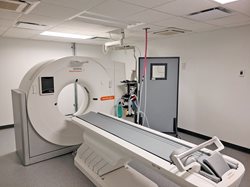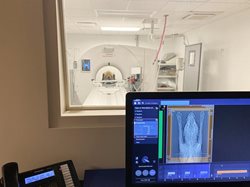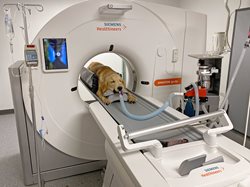Riverview Animal Health Centre is thrilled to offer Computed Tomography (CT) Scans for your pets.
Our state-of-the-art Siemens 64-slice CT scanner enables us to swiftly and accurately diagnose a wide spectrum of conditions, including head, spinal, joint thoracic, and abdominal pathology. Additionally, it proves invaluable in pre-operative planning for surgeries involving large subcutaneous masses.
At Riverview Animal Health Centre, we prioritize efficiency and responsiveness. Our CT scan services boast minimal wait times, often accommodating patients within a few days. Emergency cases receive immediate attention. Reports, generated by a Board-Certified Radiologist, are typically delivered within 24-48 hours, facilitating prompt communication of results to the referring veterinarians.



To help you understand more about this advanced diagnostic tool, we’ve compiled a list of frequently asked questions.
Frequently Asked Questions
What is Computed Tomography (CT)?
Computed Tomography, commonly known as a CT scan, is an advanced form of X-ray. It captures detailed cross-sectional images of the body part under examination. These images are then combined by a computer to create a comprehensive 3D representation. This technology offers veterinarians a more detailed view of organs, bones, or blood vessels than traditional diagnostic methods.
Which animals are eligible for CT scans?
CT scans are versatile and can be performed on a wide range of animals, from tiny pocket pets to large dogs weighing up to 200lbs.
Why might your pet need a CT scan?
CT scans are incredibly useful for diagnosing various conditions in pets. They can help detect cancer, spinal cord injuries, sinus diseases, bone irregularities, and assess internal organs like the heart, bladder, kidneys, and liver. They are also valuable for examining blood vessels. This technology has revolutionized veterinary medicine by enabling the diagnosis of conditions that might previously have required surgery.
How can your pet get a CT scan?
If you think a CT scan might benefit your pet, the first step is to consult with your veterinarian. If they agree, they will coordinate with our doctors at Riverview Animal Health Centre to schedule the scan as soon as possible.
Is anesthesia required for a pet CT scan?
Yes, anesthesia is typically required for a pet CT scan. This is to ensure that the animal remains still during the procedure; movements can blur the images and affect the accuracy of the later diagnosis. To ensure your pet’s safety and comfort, our veterinary professionals carefully manage the anesthesia process.
How long does a CT scan take, and when can I expect results?
The duration of a CT scan can vary depending on the size of the animal and the area being scanned. Generally, the scanning process itself may take only a few minutes, but the overall procedure, including preparation and anesthesia, can take longer. Results are typically available within a few days, allowing our veterinarians to analyze the images thoroughly.
What are the risks associated with CT scans for pets?
CT scans are considered a safe diagnostic tool with minimal risks. The most significant risk involves the use of anesthesia, which is why we conduct a thorough pre-anesthetic evaluation to ensure your pet’s safety. Additionally, CT scans involve exposure to a low dose of radiation, but the risk is minimal compared to the diagnostic benefits provided.
For any additional questions or to schedule a consultation, please contact us directly. We are committed to providing the best care for your beloved pets using the latest advancements in veterinary medicine.
References